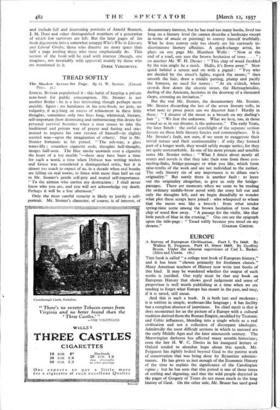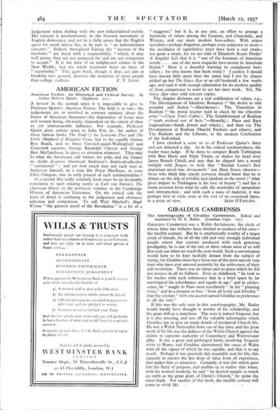EUROPE
A Survey of European Civilisation. Part I, To 1660. By Wallace K. Ferguson. Part II, Since 1660. By Geoffrey Braun. Under the editorial supervision of Carl L. Becker. (Allen and Unwin. as.)
Tan book is called " a college text book of European history," and it has been " chosen primarily for freshmen classes." Many American teachers of History now write text books of this kind. It may be wondered whether the output of such works is justified. Our reply must be that any book on European History that shows good judgement and sense of proportion is well worth publishing at a time when we are tending to forget what Europe has meant in the past, and may, if it is saved, still mean.
. And this is such a book. It is both just and moderate ; it is written in simple, workman-like language ; it has facility but a complete absence of jauntiness. Its chief merit is that it does reconstruct for us the picture of a Europe with a cultural tradition derived from the Roman Empire, modified by Teutonic and Celtic influences, blending into a single whole as a real civilisation and not a collection of discrepant ideologies. Admittedly the most difficult sections in which to succeed are the early Middle Ages and the later nineteenth century. The Merovingian darkness has affected many notable historians; even the late H. W. C. Davies in his inaugural lecture at Oxford tended to abandon hope about this epoch. Mr.
Ferguson has rightly looked beyond Gaul to the patient work of conservation that was being done by Byzantine adminis-
trators. He has given us just enough of the Economic History of the time to explain the significance of the Carolingian regime ; but he has seen that this period is one of those times of settling and -digesring, and that the wild people depicted in the pages of Gregory of Tours do not mean much in the long
history of Gaul. On the other side, Mr. Bruun has used good judgement when dealing with the new industrialised society. His interest is predominantly in the forward movement of English democracy, and yet he is fully aware that the English quest for social justice has, as he puts it, " an indeterminate outcome." Indeed, throughout Europe the " masters of the machines " are faced with a responsibility " which, it may . well prove, they are not prepared for and arc not competent to accept." It is the view of an enlightened citizen of the New World ; but the whole treatment bears no trace of " superiority." This quiet book, though it does not aim at breaking new ground, deserves the attention of more people















































 Previous page
Previous page